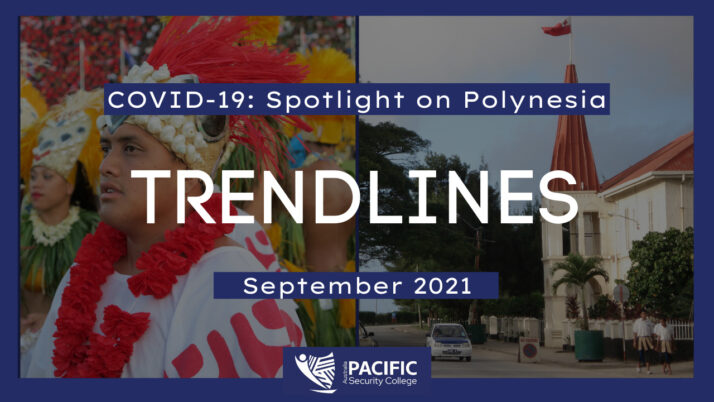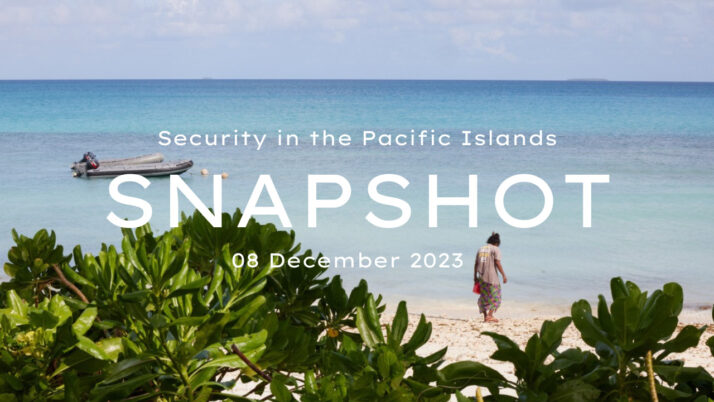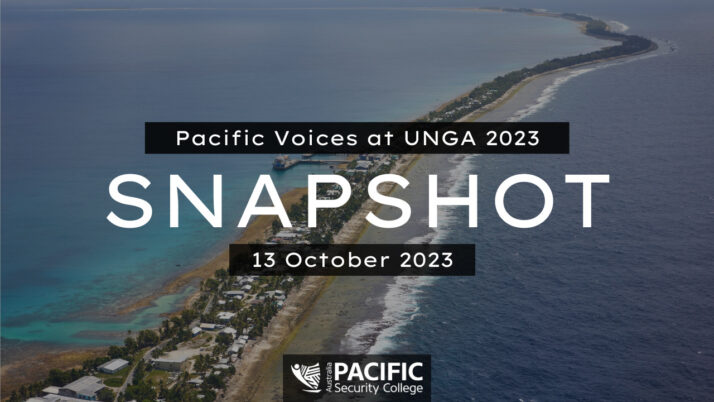COVID-19 Trendlines: Spotlight on Polynesia

18 months into the COVID-19 pandemic, the countries and territories of Polynesia account for many of the last remaining places on the planet that have not recorded a single case of COVID-19. Tonga, Tuvalu, American Samoa, Cook Islands, Niue and Tokelau each remain COVID-free, while Samoa has recorded just one case.
This special edition of COVID-19: The Pacific Response, will explore the trendlines behind these Polynesian countries and territories’ COVID-19 success story to-date.
Trendlines
- Strict border closures have been the decisive factor in determining the success of Polynesian governments in insulating communities from the virus
- Vaccine coverage is unequal across Polynesia, with vaccination rates highest in New Zealand’s ‘Realm countries’
- National governments face challenges on multiple fronts. The shutdown of the tourism industry in Polynesia has placed a significant strain on the region’s economy, while increased expenditure demands have plunged national budgets into deficit
Immediate lockdowns and response
Recognising the threats posed by the virus, Polynesian countries moved quickly to close their borders to international arrivals in March and April 2020. Borders were closed to the steady stream of cruise boats and tourists which underpin the sub-region’s economy, and night-time curfews saw the vibrant Polynesian cities of Apia and Nuku’alofa fall quiet. In a March 2020 press conference, Tonga’s Prime Minister, Pohiva Tu’i’onetoa, stated:
“I am satisfied that COVID-19 is a public health emergency and is imminent and will endanger or threaten to endanger lives of people in Tonga, therefore this requires a significant and coordinated response”.
Nightclubs, bars and kava clubs closed, while public gatherings, including church services, were restricted. While most State of Emergency declarations were initially called for just 14 days, 18 months on, State of Emergency powers remain in place in the three independent nations of Samoa, Tonga and Tuvalu.
Recognising the limited health facilities in remote parts of the sub-region, and underlying health comorbidities, such as high non-communicable disease rates, traditional leaders have time-and-again appealed for a no-risk approach to lockdowns and border policies. For example, the Faipule of Tokelau’s Atafu atoll has advocated for a conservative approach to border policies, citing his community’s fears.
Travel
Strict border policies have been essential in insulating Polynesian communities from the virus. However, Polynesians have always been travellers. Border closures have meant that significant diaspora communities in New Zealand, Australia and the United States have struggled to return home for cultural and family commitments, resulting in great sadness, but also innovative digital connections.
Further, the significant numbers of Polynesians abroad for seasonal worker or study programs have spent much of the past 18 months trapped out of their homelands due to bottle-necks in repatriation efforts. With Samoa and Tonga requiring repatriated citizens to spend 21 days in managed border quarantine, thousands have been left waiting for many months to return home. Repatriation flights have frequently been postponed or cancelled when source destinations, including Australia and New Zealand, have reported an outbreak of cases, leaving thousands of students and workers stranded and unable to return home, raising significant welfare concerns.
The tourism sector underpins the economy of many Polynesian countries and territories. So it’s no surprise that discussion of travel bubbles has rarely been far from the front pages. After many false starts, a travel bubble was formed between Cook Islands and New Zealand in May 2021, and one-way quarantine-free travel is available from Niue to New Zealand. COVID-free Tokelau is now the only realm country to not be actively pursuing a border bubble, deeming the risk too great. When announcing the travel bubble with New Zealand in May, Cook Islands Prime Minister Mark Brown said:
“Our economy has been devastated, today we start our journey of recovery. Today, we get back into business and today, we start to rebuild,”
Travel bubbles between Samoa and New Zealand, and Samoa and American Samoa have been mooted, while there has been discussion of a bubble between New Zealand and Tonga. In early 2021 Australian media reported on extending the Tasman Bubble to include Fiji and Tonga. However, with escalating Delta-strain cases in Australia, New Zealand and Fiji, this looks a way off.
Vaccines
Polynesians living in externally-governed territories have a distinct advantage when it comes to accessing vaccinations. Vaccines arrived in American Samoa on 21 December 2020. Vaccination rates are currently highest in New Zealand’s ‘Realm countries’, with Cook Islands reporting 96% full vaccination, Niue reports it has achieved herd immunity, while the campaign is underway in Tokelau. No doubt this success has been aided by logistics planning assistance from Wellington and Washington D.C.
Vaccination drives are well-advanced in Samoa, Tonga and Tuvalu, with vaccine shipments arriving bilaterally from both Australia and New Zealand, and through the COVAX initiative. 19% of the target population in Samoa are fully vaccinated, with 44% having received one dose. In Tonga, where the government is set to introduce a compulsory vaccination policy, which would make it a crime for anybody to refuse to be vaccinated, 24% are fully vaccinated, while 27% have received one dose. 4,772 first doses have been administered in Tuvalu, which has a target population of 6,400.
Governments have set ambitious vaccine targets. The Samoan Government has announced that it will not reopen its border until 98 percent of its population is vaccinated, with Samoa’s health chief Leausa Dr Take Naseri stating:
“We are pleading to the public that if we do not have 98 to 100% vaccinated … it will be very hard for us to fight the virus and also make it harder for us to open our borders to the world”.
Political economy
With the extended closure of the dominant tourism industry, much of Polynesia has been plunged into recession. The ADB projected GDP will fall by 26% in the Cook Islands for financial year 2021, while losses are also predicted to be significant in Niue, where tourism expenditure accounted for one third of pre-pandemic GDP. With tourism suspended, 37% of businesses have closed, and around a third of business owners are not confident their business will survive the pandemic.
As government revenues fall and expenditure demands mount, national budgets are under pressure. In Tuvalu, COVID-19 related government expenditure has equalled 10.4% of GDP – taking a significant toll on national finances. Many Polynesian governments have announced multiple stimulus measures, with popular policies including direct stimulus cheques to households, utilities concessions, business grants, early access to superannuation, mortgage relief and expansions to pensions and other social welfare payments. Many countries have returned their largest-ever budget deficits, with expenditure equalling 160% of GDP in Tuvalu, cushioned by their prudent trust fund. With money in short supply in the region, remittances from abroad have lifted, particularly to Samoa, where the Central Bank reports consistent increases in remittance volumes, month-on-month.
Outlook
Delays in vaccination have the potential to create two Pacifics. Indeed, countries with high vaccination rates have been identified by the Asian Development Bank as being most likely to see a successful resumption of tourism, facilitating job creation and economic growth – the benefits of this may already be starting to be seen in Cook Islands and Niue. The impacts of a delay in vaccination will snowball.
As Polynesia looks to 2022, leaders will have to balance continuing the success achieved to-date in insulating communities from COVID-19, with other security and economic challenges. What’s clear is that an efficient and inclusive vaccination campaign is the critical first step to opening Polynesia back up to the world.
Hugh McClure
More Stories

Security Snapshot - 11 Dec 2023
Pacific Security Snapshot | 08 December 2023
The security stories shaping the region Outcomes from 52nd Pacific Islands Forum Leaders’ Meeting in Cook Islands 12th General Assembly of the Pacific Conference of Churches Australia-Tuvalu Falepili Union signed Pacific climate change advocacy at COP28 EU-ACP Samoa Agreement signed Solomon Islands hosts 2023 Pacific Games First PNG woman for peacekeeping duties Regionalism The Fifty-Second…

Security Snapshot - 13 Oct 2023
Pacific Security Snapshot: Pacific voices at the United Nations
In this special edition of the Pacific Security Snapshot, we look at the key issues raised by Pacific leaders at the recent United Nations General Assembly, including climate change, reform to multilateral institutions and ocean health. “These challenges might be inconvenient for large economies – but I can assure the climate impacts already at our…






